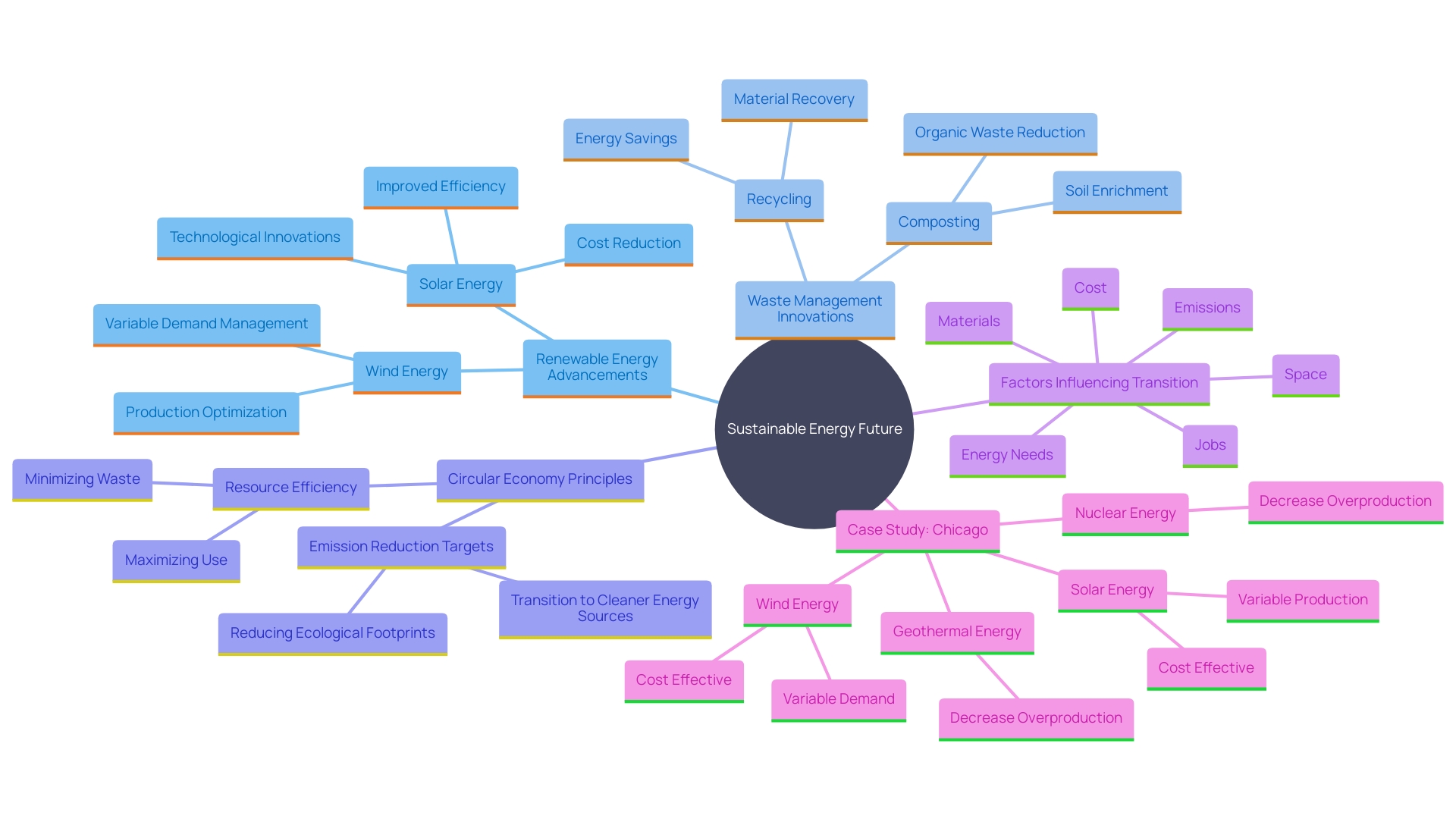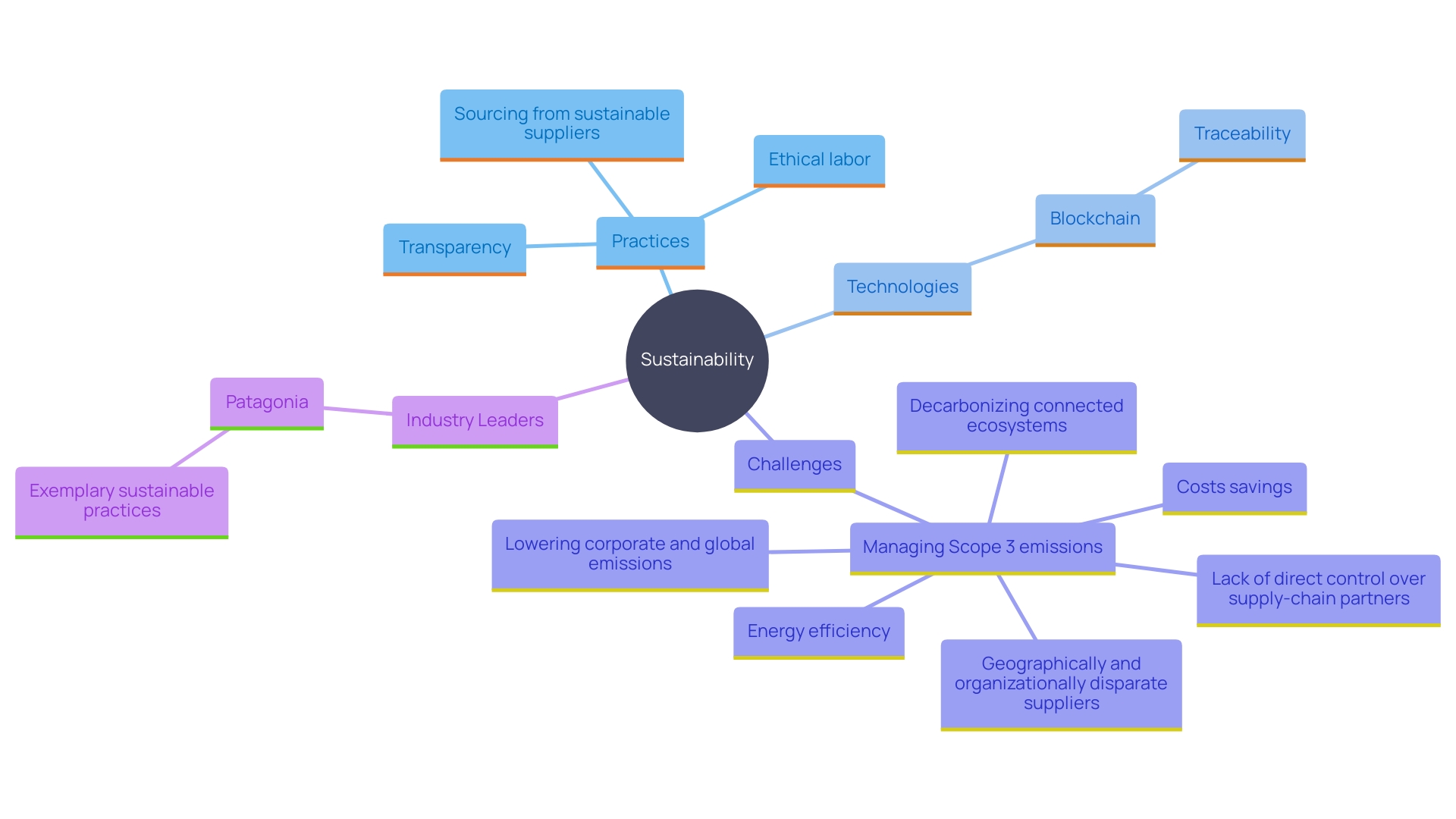Introduction
The landscape of sustainable environmental research is rapidly evolving, driven by groundbreaking innovations in green technology and AI-driven solutions. These technologies span a wide range of applications aimed at reducing environmental impact while enhancing energy efficiency. Notably, advancements in solar panel efficiency and energy storage technologies are enabling more effective harnessing of renewable energy sources.
The U.S. solar industry, for instance, installed a record 32.4 gigawatts of capacity in 2023, marking a 51% increase over the previous year. Furthermore, innovations in waste management technologies, such as advanced recycling processes and waste-to-energy systems, are crucial in minimizing landfill use and promoting circular economy principles. Circular economy practices are pivotal for achieving emission reduction targets and accelerating the energy transition, delivering economic and social benefits.
With the right momentum through investments and favorable policies, the green technology sector can play a significant role in transitioning to an environmentally friendly energy future. As these technologies continue to mature, they pave the way for more sustainable environmental practices across various sectors.
Green Technology Innovations
The scenery of sustainable ecological study is swiftly changing, propelled by groundbreaking advancements in eco-friendly innovations and AI-driven solutions. These innovations cover a broad spectrum of uses focused on minimizing ecological footprint while improving energy efficiency. Significantly, improvements in solar panel efficiency and energy storage systems are facilitating more effective utilization of renewable energy sources. The U.S. solar industry, for instance, installed a record 32.4 gigawatts of capacity in 2023, marking a 51% increase over the previous year. Moreover, advancements in waste management methods, such as sophisticated recycling processes and waste-to-energy systems, are essential in reducing landfill usage and encouraging circular economy principles. Circular economy practices are pivotal for achieving emission reduction targets and accelerating the energy transition, delivering economic and social benefits. With the right momentum through investments and favorable policies, the green innovation sector can play a significant role in transitioning to an environmentally friendly energy future. As these innovations keep advancing, they create opportunities for more eco-friendly practices across different industries.

Role of Technology in Sustainable Development
Technology acts as a crucial force in the progress of sustainable development, promoting innovations that tackle significant ecological challenges such as climate change, resource depletion, and pollution. For instance, precision agriculture tools utilize data analytics and IoT sensors to enhance resource use in farming, resulting in decreased chemical runoff and better crop yields. This not only enhances agricultural productivity but also contributes to environmental conservation by minimizing the adverse impacts of farming practices.
Likewise, advancements in intelligent grid systems significantly enhance energy distribution efficiency, minimizing waste and incorporating renewable energy sources into current infrastructures. These innovations are essential for shifting away from fossil fuels, the main source of greenhouse gas emissions, and progressing towards a more sustainable energy landscape. Furthermore, clean water methods, such as advanced filtration systems and desalination facilities, play a crucial role in ensuring access to safe drinking water, particularly in areas experiencing water shortages.
However, while advancements provide promising solutions, they also encounter challenges and limitations. Accessibility and affordability of devices remain significant hurdles, particularly in developing regions where resources may be scarce. Additionally, the rapid pace of technological advancements can sometimes outstrip the capacity of communities and governments to effectively implement and adapt to new solutions. There may also be unintended consequences, such as environmental degradation or social inequities, that need careful consideration.
In spite of these challenges, the role of technology in eco-friendly development is essential. By fostering collaboration among governments, businesses, academia, and communities, the adoption and scaling of innovative solutions can be facilitated, ultimately contributing to the overarching goals of sustainable development. This ecosystem strategy promotes ecological, social, and economic stability, paving the way for a more robust and fair future.
Emergence of Sustainable Supply Chains
Sustainable supply chains have become crucial in promoting environmental preservation. Organizations are increasingly adopting practices that emphasize transparency and accountability throughout their supply chains. This involves sourcing materials from sustainable suppliers, reducing carbon footprints, and ensuring ethical labor practices.
Cutting-edge technologies, like blockchain, are being employed to improve traceability, enabling consumers to confirm the eco-friendliness assertions of products. For example, the Research Project, in partnership with Vechain and DNV, created a system to purify waterways, demonstrating blockchain's potential in environmental initiatives. Similarly, Patagonia has set a benchmark by integrating responsible practices into its core business operations, from becoming the first benefit corporation to prioritizing environmental and social concerns over profits to adopting a 'going purpose' strategy instead of going public.
Despite these advancements, challenges remain. According to MIT CTL's Josué Velázquez Martínez, many companies still struggle with aligning their environmental ambitions with real progress, particularly in managing Scope 3 emissions, which account for the vast majority of a company’s carbon footprint. Heightened investor pressure has led to a 25% increase in eco-friendly initiatives over the past five years, yet 67% of firms lack a net-zero objective.
As companies embrace these practices, they not only contribute to environmental protection but also respond to consumer demand for responsible sourcing, thereby gaining a competitive edge. The clothing sector, accountable for 6.7% of worldwide greenhouse gas emissions, illustrates this change, with firms such as Patagonia pioneering the integration of eco-friendliness into their business model and promoting more environmentally friendly lifestyles among their clients and staff. This trend reflects a broader movement towards sustainability, driven by both technological innovation and evolving consumer expectations.

Challenges and Future Prospects in Sustainable Technology
In spite of the considerable progress in eco-friendly innovations, many obstacles remain. High initial costs, regulatory barriers, and a lack of public awareness can hinder the widespread adoption of eco-friendly practices. Furthermore, incorporating new innovations into current systems frequently requires significant investment and cooperation among stakeholders. However, the future prospects for sustainable innovation remain promising. This optimism is driven by increasing public awareness, supportive governmental policies, and the continuous development of innovative solutions.
As highlighted in the Climate Progress Report 2023, the role of innovations in mitigating climate change is increasingly recognized, but the deployment barriers and enabling conditions are still not fully understood. The report underscores the importance of both local and global perspectives in assessing climate technology progress and aims to provide annual insights on these developments.
Furthermore, academia and government play essential roles in promoting environmentally friendly practices. From research and development to policymaking and funding, these combined efforts are essential in driving the industry towards greener solutions. As Florent, an expert in clean tech business development, notes, the adoption of climate tech is fundamental for organizations aiming to create a sustainable future.
The green technology sector is transforming industries worldwide, promoting conservation and reducing environmental impact. Innovations such as solar panels, wind turbines, electric vehicles, and smart grids are pivotal in this transition. Joel Makower of GreenBiz observes, “Another year, another round of ups and downs. Still, 2023 saw plenty of progress,” reflecting the ongoing advancements despite challenges.
Furthermore, the necessity for support from professional organizations like IEEE is evident. These organizations can help set standards, provide resources, and facilitate knowledge exchange, accelerating the industry's journey towards sustainability. The joint initiatives across different areas are essential to attaining a more enduring digital future, as highlighted in numerous industry reports.
Looking forward, the advancement and spread of eco-friendly innovations hold the potential for significant breakthroughs. With ongoing research and innovation, these technologies can improve efficiency and effectiveness, ultimately resulting in a more enduring future. The ongoing drive towards sustainable development, as defined by the United Nations, seeks to meet present needs without compromising future generations' ability to thrive and prosper. This holistic approach ensures that technological advancements are not only environmentally sound but also economically viable and socially beneficial.
Conclusion
The advancement of green technology and sustainable practices is reshaping the environmental landscape, addressing critical issues such as climate change and resource depletion. Innovations in solar energy, waste management, and smart grid technologies are crucial for enhancing energy efficiency and reducing environmental impact. The U.S. solar industry's record capacity installations in 2023 exemplify the growing momentum behind renewable energy and the broader shift toward sustainability.
However, challenges remain, including high initial costs, regulatory hurdles, and the need for greater public awareness. Companies often struggle to align sustainability goals with measurable progress, particularly regarding Scope 3 emissions. Collaboration among governments, businesses, and academia is essential to overcome these challenges and foster a culture of innovation.
Increased pressure from consumers and investors for responsible practices is driving organizations to adapt and prioritize sustainability.
Looking ahead, the prospects for sustainable technology are promising, with ongoing research and innovation poised to yield significant breakthroughs. Focusing on sustainable supply chains and ethical sourcing will further integrate sustainability into business operations. As the green technology sector evolves, it is vital to ensure that advancements not only tackle immediate environmental challenges but also contribute to a resilient and equitable future.
Continued investment in sustainable technologies and practices is imperative for achieving long-term environmental and economic sustainability.




